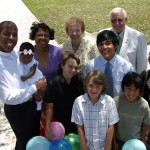The Holy Spirit and the familification of the church
Dave Black is writing a new book about the church. He has tentatively (or maybe permanently) titled it Seven Marks of a New Testament Church.
Over the last few days, he’s shared several excerpts, and they’ve been really good. But the latest except was exceptional (to me) because he also refers to another book that I highly recommend.
Here is that latest excerpt from chapter 4 of his new book (from Monday, September 23, 2013 at 9:12 a.m.):
In this chapter we have seen some of the marks of genuine community that characterized the early church. What a magnificent picture of life together! Maybe theirs was an idealism that cannot be repeated today. We may talk about community, but if we continue to behave like a group of individualists, no one will believe what we say. The picture that Luke gives us of the earliest church should make us stop and think.
Joseph Hellerman, author of When the Church Was a Family, has some interesting comments to make about the vitality of the church (p. 143). “It is time,” he writes, “to inform our people that conversion to Christianity involves both our justification and our familification, that we gain a new Father when we respond to the gospel. It is time to communicate the biblical reality that personal salvation is a community-building event, and to trust God to change our lives and the lives of our churches accordingly.”
Our modern churches could learn a thing or two from the genuine love of the first Christians. Theirs is a shining example. And if we ask the secret of it, we do not have far to look: the secret lay in the presence of the Holy Spirit. His power is available to us all. And it is life-changing. Just imagine what the Spirit could do in our churches if He were allowed to have control. It could happen again.
First, I love the term “familification” that Hellerman uses in his book. It points to the fact that there is a change that happens that moves us from not being a family to being a family.
I also love that Black points out that this is a work of the Holy Spirit. If we are becoming a family, it is because we are submitting to the Holy Spirit.
And, if we are not becoming a family…
Community based on the gospel and our shared identity in Christ
A couple of weeks ago, I read a great post by Fred at “On the Journey” called “Community: Sunday at 10:30.” If you’ve read this blog for very long (probably even for a short time), then you know that community in Christ is very important to me.
I believe that when God saves us, he immediately includes us in his family and we are immediately connected to and responsible for our brothers and sisters in Christ who are part of our lives. This “community” is not one of our own making; it is built by God through his Spirit. We do not get to pick and choose who are part of that community. As I wrote once, when we accept Jesus, we automatically get everyone else at his table.
However, it takes work – yes, real work – to live in community with one another. Now, we say that work consists of yielding to or submitting to the Holy Spirit in our lives, and that would be correct. It is still work, though.
Of course, we can also try to build community that is not based on our shared identity in Jesus Christ. There are many kinds of communities like this. In his post, Fred wrote about several of those communities. Then he wrote this:
I believe the church is different. Community is something that is not based on personal preferences, on a charismatic individual, on shared experiences. In the church, the only kind of community that matters must be based on the Gospel and our shared identity in Christ. The community that God wants is a community that lives life together, learning together to follow Jesus and love our brothers and sisters. In order to do this we must be together more than one day a week. Community needs time and contact to develop. The disciples were with Jesus 24/7 for three years. The first Christians met daily, going from house to house. I know things are different in the 21st century, but we still need time with each other often. We can not do this without learning from each other on a consistent basis.
There is much to encourage us and challenge us in that short paragraph. Yes, it takes time, patience, grace, forgiveness, etc. to see community – even community in Christ – grow and flourish. And, it does take the humility necessary to “learn from each other on a consistent basis.”
But, when you read that, you may be disheartened because you are part of a group who only meets once a week in a pre-planned, scheduled gathering (often called a “worship service”). Does this mean that community in Christ is impossible for you? Not at all.
This is how Fred ends his post:
If you are part of a church body that meets in a building at a particular time on a particular day and gathers as friends and family at various times throughout the week, good for you. If not, why not begin?
Good question, Fred. Why not?
Replay: Reciprocity and Mutuality among the Church
Four years ago, I wrote a post called “Reciprocity.” In the post, I looked at the meaning and importance of “reciprocal pronouns” in Scripture. Then, I consider some of the reciprocal/mutual instructions that we find in Scripture. Some of those instructions are easily recognized and accepted as mutual by the church today. However, others are not usually seen as being mutual – even though they use the same kind of mutual pronoun in Scripture. I wonder what would happen if these we not only recognized, but lived as mutual/reciprocal instructions.
———————————-
Reciprocity
According to Princeton’s wordnet, “reciprocity” means “a relation of mutual dependence or action or influence.” Similarly, a “reciprocal pronoun” is “a pronoun or pronominal phrase (as ‘each other’) that expresses a mutual action or relationship between the individuals indicated in the plural.”
Did you know that reciprocal pronouns are common in the New Testament? They are. They are usually translated “one another” or “each other” or even “each one”. Reciprocal pronouns are very important for us to understand how we should relate to one another. Many times, this relationship is obvious and easy to understand.
For example, in 1 John 4:7, John writes that we should “love one another.” (ESV) Most believers recognize that our relationship with one another should be expressed with mutual love. If person A loves person B, but person B does not love person A, we recognize that they are not loving one another.
Similarly, in 1 Peter 5:14, Peter writes that we should “greet (or welcome) one another.” (ESV) Again, it is easy to recognize that if one believer greets someone, but the greeting or welcome is not returned, then they are not greeting one another.
In James 5:9, James writes, “Do not grumble against one another.” (ESV) Grumbling probably means complaining. So, believers should not complain about one another. So, if one sister refuses to complain, but another sister does complain, then the two are not following James’ command. They are grumbling against one another.
We find Paul using reciprocal pronouns often. For example, in Galatians 5:13, he tells us, “Through love serve one another.” (ESV) This is also a command that recognize as a reciprocal command. If a brother is serving someone, but that brother refuses to serve, then the two are not serving one another.
But, there are other reciprocal instructions that are difficult to understand. In fact, in some circles, the reciprocity is removed from these commands.
Consider Paul’s statement in Colossians 3:16. He says that when the word of Christ dwells in us richly, we will demonstrate that by “teaching and admonishing one another.” (ESV) How reciprocal are we with this instruction? If one person teaches, but another person does not teach, do we recognize that they are not teaching one another? What if one person is admonishing but another is not admonishing? Do we allow this instruction to only apply to some believers but not to other believers?
Paul makes a similar statement in Romans 15:14, where he says that he is convinced that the Romans are “able to instruct (admonish) one another.” (ESV) Does the reciprocity in this statement apply only to the Romans? Did they have something that believers today do not have? Or, could God still expect all believers to teach/instruct/admonish reciprocally?
Another interesting reciprocal statement is found in Romans 14:19. Again speaking to the believers in Rome, Paul says, “So then let us pursue what makes for peace and for mutual upbuilding (the edification of one another).” (ESV) The reciprocal pronoun is harder to see in the ESV translation “mutual upbuilding.” But apparently Paul that it was important that all of the believers in Rome reciprocally pursue those things that led to peace and edification. Is this still something that we all pursue reciprocally.
Peter writes some of these difficult reciprocal commands also. In 1 Peter 4:10, he writes, “As each has received a gift, use it to serve one another, as good stewards of God’s varied grace.” (ESV) Do we recognize the importance – the necessity even – of all believers exercising their spiritual gifts in a manner that can serve other believers? Do we sees this as every believer’s responsibility?
There are many other “difficult” reciprocal commands. A couple would include “submit to one another” (Ephesians 5:21), “humble yourselves before one another” (1 Peter 5:5), or “count one another as more significant than yourselves” (Philippians 2:3). These, and many, many other commands in Scripture, are reciprocal commands. That means that the commands are give to a plural group to be carried out as “a mutual action”.
Why do you think its easy for us to recognize “love one another” and “serve one another” as mutual requirements, while we tend to not recognize “teach one another” or “edify one another” as mutual requirements?
The accidental organic/simple church
A few years ago, my family was part of a group of believers who decided to leave one church organization in order to form another church organization. That new church organization became “Messiah Baptist Church.” We were a typical Southern Baptist group, many of us with ties to a local Southern Baptist seminary.
A few things happened in those early days that influenced what happened in the coming years.
First, several of us were interested in ecclesiology (the study of the church). Second, almost all of us held a high view of Scripture and desired to compare everything that we believed and did to Scripture. Third, we did not have a place to meet throughout the week, so we rented a community center on Sunday and met in homes during week for Bible studies. Fourth, we decided to eat together regularly – every week at first, and then at least once per month. Finally, we were a small, poor group so we could not afford to pay someone to be our “pastor” and to preach every week.
Like most new church organization, we began with a set of bylaws, church membership covenant, and a leadership team (since we couldn’t afford to pay one person). We met on Sundays for a “worship service,” complete with a band and a sermon (with different people – primarily one of the chosen leaders – preaching each week). We had several home-based “Bible studies” since we could not do Sunday school in our Sunday meeting location. (By the way, these Bible studies became the medium through which we built very strong relationships with each other.)
As I said, we desired to compare everything that we believe and did according to Scripture, and over the next few years many, many things changed. The primary thing that changed is how we thought of ourselves and our relationships with God and with one another. Gradually, the focus on the organization faded, and relationships became much more important.
Of course, everyone did not appreciate these changes, and preferred “church as we know it” – as it’s been called. Interestingly, several of us remain connected with those who no longer meet with us because of those disagreement about the church… and we continue to serve them whenever we can.
Today, we continue to gather weekly. But, our gathering are much more interactive and teaching is primarily through discussion and dialog. We do not have a band or even a planned set of songs that we sing each week. We sing if someone has a song they would like to sing. We often gather in each other’s homes, at the park, at the beach, anywhere and for almost any reason. We share our lives with one another, and still easily welcome new people we meet.
As people move away from our area, we often find that we’re able to stay in contact with one another because of the relationships that we’ve built. (Of course, this doesn’t happen with everyone who moves away.)
In many ways, we still have aspects of traditional church organization, especially when we gather on Sunday mornings. On the other hand, we also have many aspects of simple/organic churches. (This is why I often say that we’re a “hybrid.”)
In fact, many people who prefer more organized church think that we’re not structured enough. People who prefer more simple/organic type church life often think that we’re too organized. (And, I like it that way… )
We did not set out to start an “organic church” or “simple church.” If you asked many of the people who we gather with regularly, they would probably not even know the phrases “organic church” or “simple church.”
Instead, we are simply a group of followers of Jesus Christ who are at a certain state in our life with God and our lives with one another and continue to seek to help one another group in maturity in Jesus Christ.
I would not recommend that other groups take that same journey that we take or seek to be at the same point we’re currently at. So, what do I recommend? Exactly what I said above: be a group of followers of Jesus Christ who are at a certain state in your life with God and your lives with one another and continue to seek to help one another group in maturity in Jesus Christ.
Where are the organic/simple church people hiding?
Last year, two of my most read posts were “People want real examples of organic church life” and “Why is it so difficult to find organic church life?”
In those posts, I talked about how people are tired of theory and simply talking about organic/simple church. But, when they look for real, living examples of these groups of Christians, they often can’t find them. There are many reasons for that, beginning with the fact that most groups are not incorporated, they don’t advertise/market, they don’t have a big, flashing sign with a cute saying, etc.
So, if someone wants to meet others who are interested in this different kind of “church life,” what should they do?
Now, Nathan at “Joined to Him” has written a very good post called “7 Tips on How To Find Organic Church Life.”
After a brief introduction, he offers these seven tips:
1. Pray, pray, and pray some more.
2. Join Facebook Groups dedicated to Organic Church Networking.
3. Follow up on potential leads.
4. Start a blog and talk about your journey and desire for organic church community.
5. Start small and trust the Lord.
6. Move to a new location.
7. Lower your expectations.
(Please take the time to read Nathan’s post. He explains and gives examples for each of his seven tips.)
What do you think about Nathan’s tips? What would you add, remove, or modify?
Real relationships centered on Jesus Christ
Last week, I published a post called “What do you want to talk about?” In that post, I asked my readers what topics (related to the church) they would like to discuss.
In some ways, I was surprised at the responses in the comments. Usually, when I ask a question like that, I hear responses like “elders/pastors/leaders,” “the Lord’s Supper,” “church discipline,” “preaching/sermons,” etc.
But, the responses that I got this time were quite different:
“I’m just wondering if other believers are as discouraged and concerned about the decay of real community and fellowship even in the churches small group settings?” -from Glenn
“Maybe some concrete examples, suggestions, and tips on how to build relationships and friendships with people in our community, …especially when you live in a new area and don’t know anyone.” -from Jeremy
“I would be interested in hearing stories of how others are going about making disciples in their neighborhoods.” -from Mark
“Open fellowship is great, and the Lord does work sovereignly in that context, but there seems to be a difference when the headship of Christ is collectively sought. I’d love to hear your thoughts on how that can be more intentionally pursued and lived in by a body of believers.” -from David
Did you catch the common theme? Relationships. But, I think each of these commenters would agree that they are not interested in just any relationships. They are interested in relationships which are centered on Jesus Christ.
So, how do we pursue relationships with one another while continuing to pursue Jesus Christ together? What if we do not know anyone in our area (perhaps we are new to the area)? How do foster those relationships into mutually discipling relationships (or is that automatic if our relationships are centered in Jesus Christ)?
I think these are good questions – much better than the questions that I usually see people asking about the church. I think these are foundational questions. And, I also think that if we do not seek these kinds of relationships (centered in Jesus Christ), then it doesn’t really matter how we answer the earlier questions about elders/pastors, the Lord’s Supper, etc.
Relationships are easy to discuss on a theoretical level. But, in reality, they’re much harder to live. They’re messy. How we share our lives with one another (or don’t share our lives with one another) is a very good indicator of our relationship with God, however.
So, I’m glad that my readers are interested in discussing real relationships with one another which are centered on Jesus Christ. It’s a scary topic however…
What do you want to talk about?
My family jokes that I can talk to anyone. That’s probably not literally true, but I can usually talk to most people. There’s a very good reason that people usually talk to me: I ask them about themselves and their likes and dislikes, and I listen to their response.
I’ve found that people typically like to talk about themselves, especially to people who are genuinely interested in hearing about them.
Of course, that doesn’t meant that people immediately go into the intimate details of their lives, but as they learn that you will listen (and not tell everyone else), they soon learn to trust you with more and more personal information.
You know what? I’ve found the same thing happens on my blog. People like to think about, talk about, and write about different topics related to the church. Some people are passionate about one thing, while others care deeply about something else.
What about you? What topics (related to the church) would you like to see us discuss here?
Replay: The blessings of community…
Six years ago, I wrote a post called “The blessings of community…” In that post, I wrote about a “going away party” that God used to show me the beauty in the diversity and unity of the brothers and sisters in Christ that he had placed in our lives. Looking back now, many of those people have moved away and are part of different communities. Today, our family is part of a different community of people also. But, in everything – in that early community and in the community we’re part of now – God continues to work and to move and to express his glory in the diversity and unity of his children.
————————–
The blessings of community…
Tonight, some friends of ours hosted a going away party for some other friends who are moving out of state tomorrow. The friends that are moving are part of the community of believers that God has placed around us. There are some within this community that we know better; there are some within the community that we do not know as well. But, God has placed us all together.
Within this group of believers, there are some who hold strongly to reformed theology, and there are some who do not. Among this community there are believers that hold to almost every form of eschatology. Some prefer more organization in the church, while others prefer less organization. We also hold to different beliefs about leadership and different philosophies of service. God has gifted some primarily to teach, others primarily to serve, others primarily to evangelize, other primarily to show hospitality.
We are a diverse group. And, when we discuss certain topics – especially those that we hold dear – we discuss them with passion and zeal. We are not so timid that we will not tell someone when we disagree with them. Some enjoy these types of discussions, and some do not.
However, tonight, as I looked around this diverse group, God reminded me of something. I saw a few people tossing a football in the backyard, while others played wiffleball. Several people stood on the back deck and talked about their week. Many sat around the living room and talked in small groups. Children ran around and in and out and up and down. Different people made their way to the grill to prepare their dinner.
But, as I looked around at this diverse group, I realized that this is a very special group of people. This is the community that God has placed me and my family in. I believe that I could pick up the phone, call any of these people about a problem that I’m having, and they would do whatever they could to help. I also believe that many would help without my asking. I don’t think they would do this for just me, but they would do whatever they could for each other. I know this is true, because I have seen it, and I have experienced it.
This group is special because we love one another. Is our love perfect? No. But, we talk about that and encourage each other in loving better as well. Sometimes, we get angry with one another. Occasionally, we fail to help one another like we should. We don’t always take care of one another. We’re not perfect. But, we love one another, and we always return to that love – a love that stems from God’s love which he is creating in us by his Spirit. We don’t love each other because we are so great. We love each other because God is so great, and because he is changing us and teaching us how to love him and one another more.
So, why did I write this blog? I didn’t write it to pat myself on the back, because I had nothing to do with creating this community. This is entirely a work of God. I did not write this to exalt this group of believers. We are all ordinary people who belong to an extraordinary God.
Why did I write this blog? I wrote this blog for two reasons. One, I wanted to praise God for what he is teaching me through this community. And, two, I want to encourage others who have not found this kind of community. Wait for God. Allow him to build something that neither you nor others can build on your own.
Finally, I pray for this community often. Not just for those who gathered at this going away party tonight. But, for others that God has placed around me. This also includes many that read and interact with me on this blog. This is my prayer for all of you:
I thank my God always when I remember you in my prayers, because I hear of your love and of the faith that you have toward the Lord Jesus and all the saints, and I pray that the sharing of your faith may become effective for the full knowledge of every good thing that is in us for the sake of Christ. For I have derived much joy and comfort from your love, my brother, because the hearts of the saints have been refreshed through you. (Philemon 4-7 ESV)
Every time your name comes up in my prayers, I say, “Oh, thank you, God!” I keep hearing of the love and faith you have for the Master Jesus, which brims over to other believers. And I keep praying that this faith we hold in common keeps showing up in the good things we do, and that people recognize Christ in all of it. Friend, you have no idea how good your love makes me feel, doubly so when I see your hospitality to fellow believers. (Philemon 4-7 The Message)
I pray especially for those of you who are desperately seeking to live as community with other believers, but have not found that yet. May God grant your desire and strengthen you through it. And, may he grant you peace until that time.
Replay: Donkeys sleeping in the bathtub
Four years ago, I published a post called “Donkeys sleeping in the bathtub.” The post was inspired a commercial that was airing around the time that I wrote the post. The commercial was about crazy laws that were on the books in certain states. It made me think about how there are certain traditions among the church, and how those traditions started, and how those traditions just seem to hang around… whether they are helpful or not.
——————————————–
Donkeys sleeping in the bathtub
According to a commercial on the radio, there is a law in Arizona that makes it illegal to allow a donkey to sleep in your bathtub.
Also, apparently, in Minnesota, there is a law that makes it illegal to cross the Minnesota state line with a duck on your head.
While these laws seem funny and even ridiculous to us, there was probably a good reason for passing the laws in the first place. If we traced the history of these laws, we would probably understand why the laws are on the book. However, while the history may clear things up for us, history will not make the laws make sense today.
Why? Well, most people don’t own donkeys today, much less allow them to sleep in their bathtubs. And, I don’t think I’ve ever seen someone with a duck on their head.
But, of course, once a law is on the books, it is difficult to remove it.
The same thing happens with our traditions and practices and rules in the church. For very good reasons, the church begins doing things and begins doing them in certain ways. Eventually, the reasons disappear, but the practices continue.
Eventually, if we’re not careful, those practices become more important to us than who we are as the family of God in Christ. The way we do things becomes more important than the reason we started doing them in the first place. We become defined by our methods instead of being defined by our relationship with God and with one another.
I think we see this today in many aspects of our lives together as the church. We don’t know why we do the things we do or why we act the way we act or why we’re structured the way we’re structured, but someone must have had a good reason to start doing it this way, and we’re familiar and comfortable with these things, so we just let them continue.
But, the silly laws I mentioned at the beginning of this post – laws against donkeys sleeping in bathtubs and wearing a duck on your head – generally don’t affect people today. For many people, their lives will not be changed if the laws remain or are repealed.
But, it is completely different for the church. The things that we do day after day, week after week, year after year, simply because that’s the ways it’s been done, or the ways we’ve been taught, or the ways that have worked before, or even the ways that seem rational and logical… these things affect us as followers of Jesus Christ. They affect our relationship with God and our relationships with one another.
The things that we do or don’t do, the way that we’re structured or not structured, the way that we speak or don’t speak, all of these things work to either build us up toward maturity in Christ, or they hinder our development in Christ.
Laws against donkeys sleeping in the bathtub seem funny and ridiculous to us. But, I wonder if the way we treat one another as the church, the way we set up hierarchies among believers, the way we abandon our responsibilities toward one another and pay others to carry out our responsibilities… I wonder if these things seem funny to God.
Disconnected Church Connections – Of the Lack of Relationships Among the Church
In a previous post, I explained that I was starting a new series on the topic of “disconnected connections.” (See my post “Disconnected Church Connections – Introduction.”) I’ve already discussed the “disconnected connections” that we make by reading books, articles, essays, and, yes, even blog posts, the “disconnected connections” that we make online, and the “disconnected connections” we have with various types of speakers. (See my posts “Disconnected Church Connections – Of Authors and Similar Personalities,” “Disconnected Church Connections – Of Online Friends and Followers,” and “Disconnected Church Connections – Of Speakers at Seminars, Conferences, and More” respectively.)
What do I mean by “disconnected connections”? We can often feel “connected” to other Christians without face-to-face interactions. We often feel like we “know” people who we have never met. (As I explained in the introduction, I am not condemning disconnected connections. Instead, I’m cautioning that these types of relationships should be supplemental (and secondary) to real life, face-to-face interactions.
In this conclusion to my series on “disconnected connections,” I’d like us to think about one question: Why are people drawn to “disconnected connections” among the church? So far, I’ve talked about various types of relationships that are often seen as very important among the church, and yet these relationships do not provide the face-to-face, intimate connections and interactions that we need for growth and maturity in Jesus Christ.
I think the answer is quite simple: Among the church today, those kinds of real, face-to-face, intimate relationships are extremely rare or, in some cases, nonexistent.
For too long, the church has emphasized activities and programs that hinder those kinds of relationships. Yes, Christians have always SAID that relationship was important. But, when the rubber hits the road, relationships were put on a back burner, at best. The church focused on information, organization, and attendance. Through all of these, Christians learned that relationships were not really important.
In past generations, community and relationship developed naturally, primarily because people tended to stay in one location their whole life. However, when that change, community and relationship became less natural. So, it was easy for Christians to set aside important relationships just as others in our culture were doing.
Instead of the important face-to-face interactions that God uses to help us grow and mature in Christ (expressed beautifully in Scripture through the many “one another” instructions), the church turned to “disconnected connections” and encouraged others (intentionally or unintentionally) to turn to “disconnected connections” as well.
What’s the answer? We cannot continue to emphasize the “disconnected connections” and expect people to build intimate relationships as well. Instead, we must emphasize those real, live, face-to-face kind of interactions that actually help people grow and mature in Jesus Christ. Instead of giving special time to “disconnected connections,” we must set those aside and give that time to building relationships – showing that these interactions (“one anothers”) are truly important to us and no longer only giving “lip service” to the importance of relationships.
Finally, we must model these kinds of discipling relationships, being willing to invite people into our lives, being willing to listen and learn from them, being willing to wait for God to work through the often slow and messy process of community.
Our relationships with one another in Jesus Christ are extremely important, and we must be willing to show people that they are important.
—————————————








